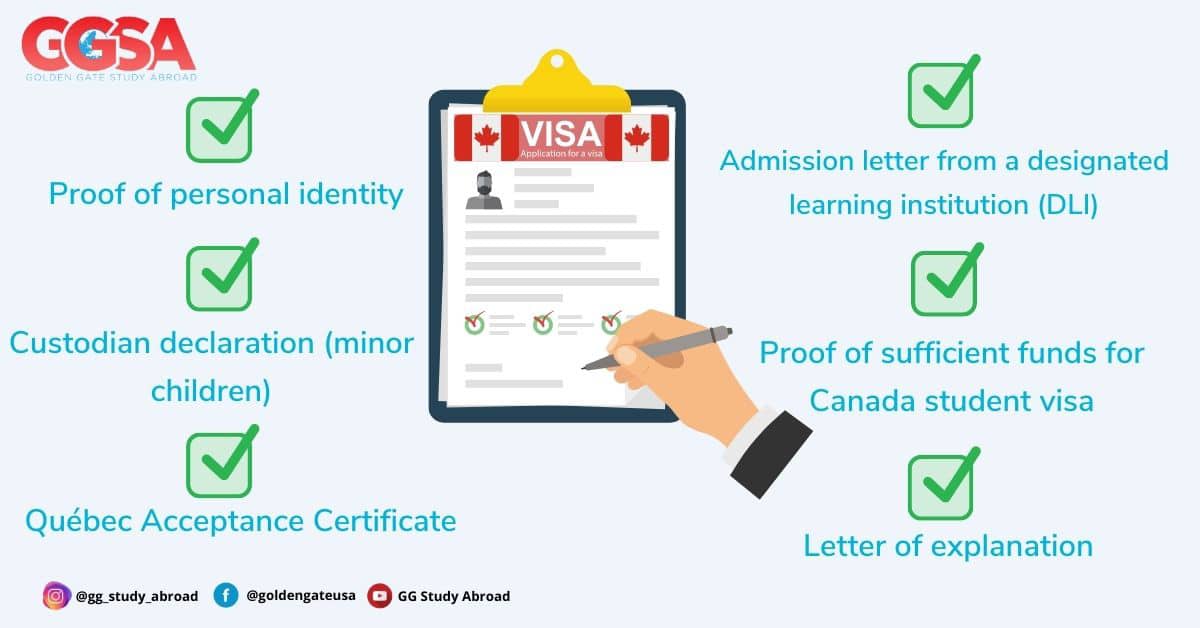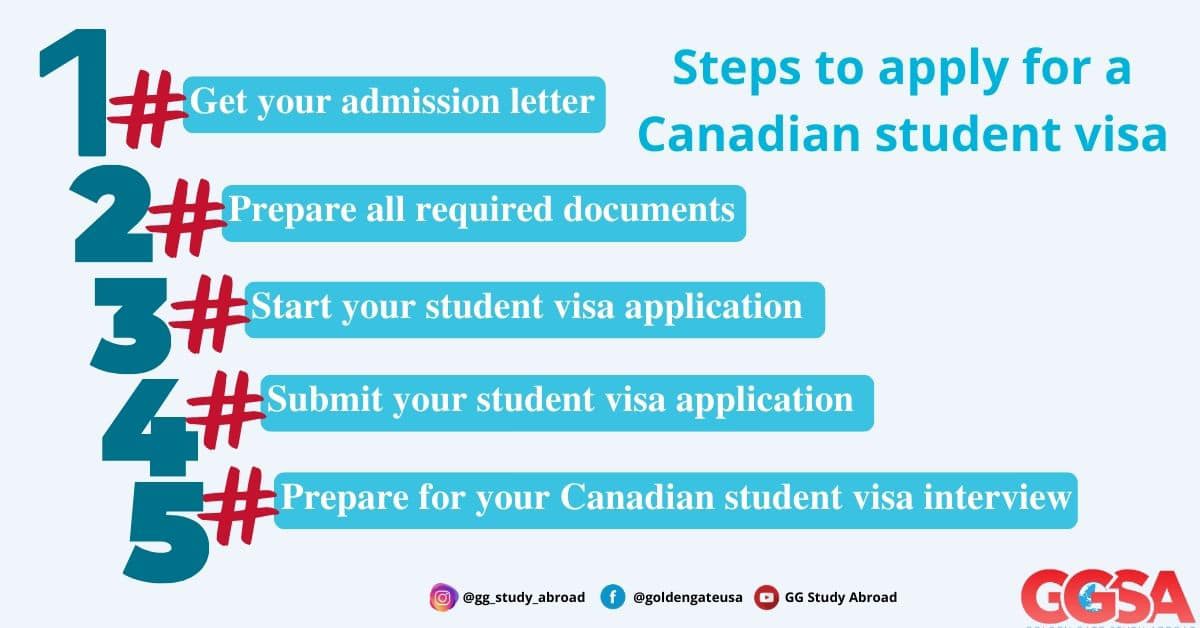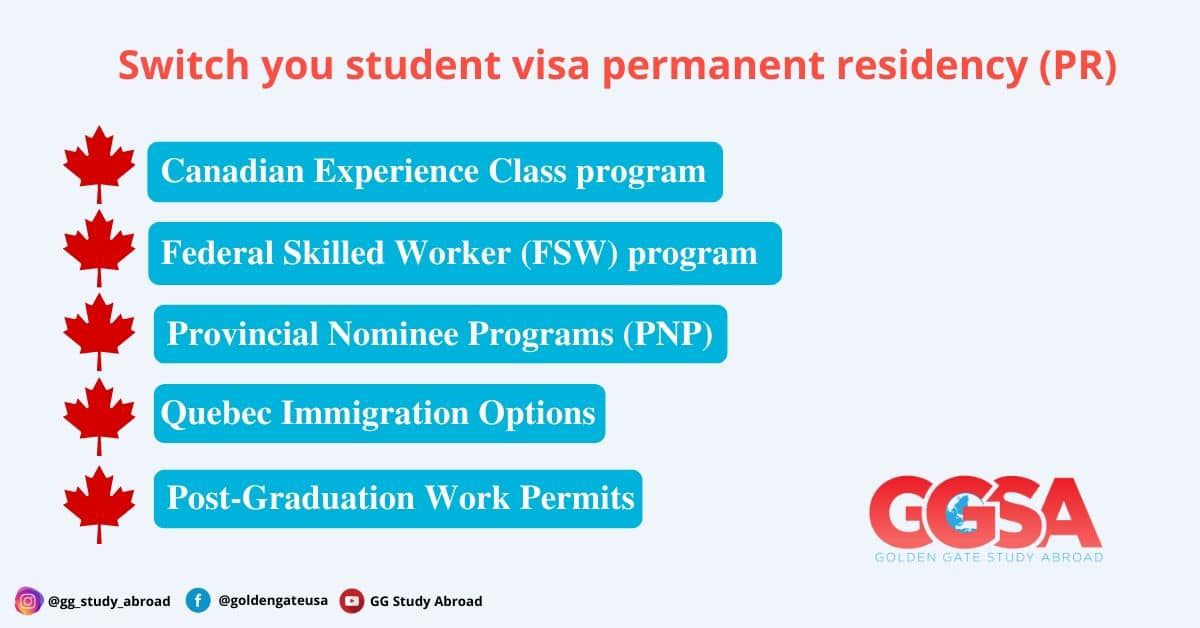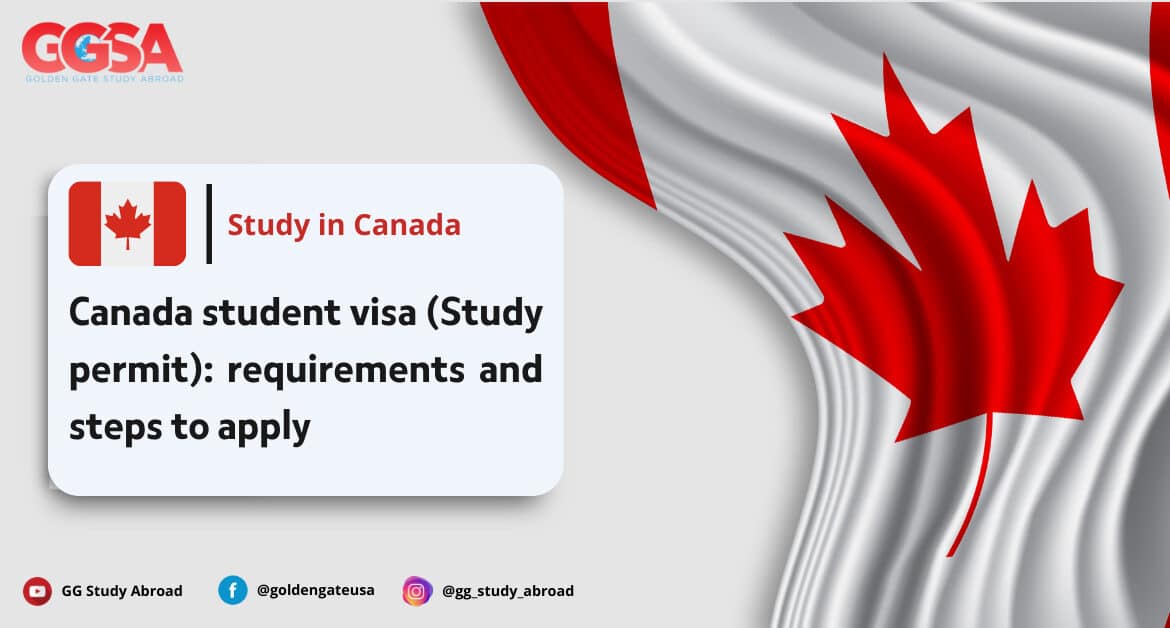Since the title of our article grabbed your attention, I guess you are interested in studying in Canada as an international student! You should know that getting a Canadian student visa is the most crucial step to traveling and studying in Canada. So if you have doubts about Canada student visa, requirements, application procedures, and cost, check our guide on how to get your Canadian study permit.
Who needs a Canadian study permit?
International students are required to apply for a Canadian study permit in order to complete their education or training that is more than 6 months. The study permit helps you to reside in Canada legally for the whole duration of your studies. However, in order to apply for a student visa, you need to get an admission letter from a designated learning institution (DLI) in Canada and comply with other requirements.
In exceptional cases, international students might be exempt from the requirement for a study permit. Such as in cases of courses less than 6 months or family members and members of the private staff of accredited foreign representatives.
To find out if you need a Canadian study permit or not, check the Canadian government website tool created for this purpose.
It’s kinda confusing, but your study permit is not a visa. In other words, the Canadian study permit does not allow you to enter Canada. That’s why you need a visitor visa or an electronic travel authorization (eTA) alongside your study permit.
In most cases, once your Canadian study permit is issued, the responsible representative will issue electronic travel authorization (eTA) with it. However, if you don’t get it automatically you should ask to apply for it.
Check: Ultimate guide to cost of studying in Canada for international students
What is the duration of the Canada student visa?
Your Canadian study permit is valid for the whole length of your program in Canada plus 90 days. For example, if you are studying a master’s degree for one year, your Canada student visa will be valid for one year plus 90 days following program completion.
The plus 90 days give you sufficient time to leave Canada or to start a new application to extend your residency to study or work.
In some cases, the duration of the Canadian study visa may be shorter or longer:
- In cases of preparatory years or any additional courses, your Canadian study permit will be valid for the duration of these courses plus one year. For example, when you get a conditional admission to learn English or enroll in a preparatory year. Therefore after course completion, students need to apply to extend the Canadian study permit to be able to complete their studies.
- If the student fails to finish his/her studies within the expected date, he/she needs to apply to extend the duration of the Canadian study permit.
- If the student finishes the study course earlier than expected, the Canadian study permit will expire 90 days after the course completion.
Check: Guide to high school education in Canada for international students
Canadian student visa requirements for international students

International students need to meet all requirements to be eligible to apply for the Canadian student visa:
1. Admission letter from a designated learning institution (DLI)
International students should get an acceptance letter from a recognized Canadian institution listed on the designated learning institution (DLI) list. You can submit the original letter of acceptance in person or a scanned copy if the applicant is applying through e-Apps.
Keep in mind that in cases of conditional offers the student can still apply for a Canadian study permit. However, it will be issued for the duration of the required additional courses, such as English as a second language (ESL) or French as a second language (FSL), plus one year, as mentioned earlier.
In some cases, the international student may be exempted from submitting an admission letter. For example, if a member of his/her family has a Canadian study or work permit application approved in writing. However, this exemption does not guarantee the approval of a study permit application.
2. Proof of personal identity
International applicants for Canada student visa should provide a valid travel document or passport, plus two recent passport-size photos (the student’s name and date of birth must be written on the back of each photo).
3. Proof of sufficient funds for Canada student visa
All international students are required to prove sufficient financial resources to cover tuition fees and living costs in Canada for only the first year of studies, regardless of the duration of the course. However, it is recommended to show that the probability of funding for future years does exist (i.e., parents are employed)
The Canadian government requires international students to show a minimum of CA$10,000 to cover living expenses during the first year of their studies, prorated at $833 per month (outside Quebec), plus the cost of tuition. To apply to study in Quebec you need to show a minimum of CA$11,000.
However, if you want to apply for family members as well, you will need to prove additional funds for them. You should prove CA$4,000 for a twelve-month period, prorated at $333 per month for the first family member, and CA$3,000, prorated at $255 per month, for any additional member.
International students can prove funding by submitting any of the followings:
- Proof of a Canadian bank account in your name if you’ve transferred money to Canada.
- Guaranteed Investment Certificate (GIC) from a participating Canadian financial institution.
- Proof of a student or education loan from a bank.
- Your bank statements for the past 4 months.
- A bank draft that can be converted to Canadian dollars.
- Proof you paid tuition and housing fees.
- A letter from the person or school giving you money.
- Proof of funding paid from within Canada, if you have a scholarship or are in a Canadian-funded educational program.
Read: Why the MBA at CSUSB in the USA is the perfect program for you?
4. Letter of explanation
International students have to submit a letter explaining their goals and reasons for choosing Canada as a study-abroad destination. This letter should also reflect that you understand your responsibilities as an international student in Canada.
This document is very important for your Canadian study permit application because it helps the visa officer to understand you and your goals.
5. Québec Acceptance Certificate
Students who want to study in the province of Quebec for longer than 6 months need a Québec Acceptance Certificate (CAQ) issued by the Gouvernement du Québec.
However, If you plan to study in Quebec for less than 6 months, you can apply for Canadian a study visa without a CAQ.
6. Custodian declaration (minor children)
For international students under the legal age, they need to attach a Declaration Of Guardian.
They can fill out a form of two pages for this purpose. The custodian in Canada must sign the first page, and the parents or legal guardians of the minor child in the child’s home country must sign the second page.
7. Other documents
International students applying for Canada student visa may need to submit additional documents depending on their status, country of residency, and many other factors. Therefore, it is recommended to ask for experts’ help, like our consultants in Golden Gate study abroad, to apply for a Canadian study permit.
Check: Ultimate guide to Community Colleges in the USA for international students
Steps to apply for a Canada student visa

International students must apply online for the Canadian study permit, whether they are outside of Canada or already in Canada
So if you are wondering how to apply for a Canadian student visa, follow these steps:
1. Apply for a DLI university and get your admission letter
The acceptance letter is the most important document to start your application. Once you apply and get admitted to a Canadian learning institution, they will send you your admission letter with full information about your study program.
Golden Gate Study Abroad consultants can help you to get your acceptance letter from the best Canadian universities in no time! Contact us and get your free consultation.
2. Confirm that you need to apply for Canadian student visa
As mentioned earlier, in some cases, such as the course duration being less than 6 months, it’s an obligation to apply for the Canadian study permit. This will definitely make it faster for you to travel.
3. Prepare all required documents
While submitting your application to get the Canadian student visa, you need to fill in the application form with the right answers. Later, you need to upload all required documents with your application.
Therefore, create electronic copies of all your documents and have a valid credit or debit card to pay the online application fees.
4. Start your student visa application
Visit the Citizenship and Immigration Canada (CIC) website and start your application by answering a few questions in the “Get specific instructions on how to apply” section.
Once you start your online application for the Canadian student visa, you will receive a personal verification code that is valid for 60 days to finalize your application.
5. Submit your student visa application
Before submitting your application, you need to pay CA$150 as student visa application fees. In addition, you may need to pay a CA$85 biometrics fee when you submit your application.
The biometrics fee covers the cost of collecting fingerprints and a digital photo, and you may experience delays if you don’t pay them before submitting your application.
6. Prepare for your Canadian student visa interview
After submitting your study permit application and paying the application fee, it is a requirement to schedule an interview with the Canadian Embassy/Consulate.
This is the final stage of the process and it determines your visa approval or rejection. Therefore, it’s recommended to ask for professional help during the application process.
7. Keep an eye on your application status
You can check your application status by signing in to your account. It usually takes between 20-90 days to process the Canadian student visa application, depending on your country of residence.
Read: How to Prepare for US Student Visa (F1) Interview Like a Pro?
Can you get permanent residency (PR) in Canada on a student visa (study permit)?

International students in Canada can apply for permanent residency while studying in Canada or after completing their studies. In 2021, there was a total of 22,682 admissions of permanent residents for international students previously holding a study permit.
Most Canadian immigration programs prioritize applicants with Canadian education and experience backgrounds. Therefore, once you get your degree from a Canadian university, you will be eligible to apply to more than one immigration program.
There are 4 main Canadian immigration programs for international students:
-
Canadian Experience Class program
To be eligible to apply for the Canadian Experience Class Immigration Program you need to have at least 12 months of full-time work experience in Canada (or equivalent part-time work experience within the previous three years to your application.
However, keep in mind that part-time work experience earned during studies or as part of a study program does not count.
-
Federal Skilled Worker (FSW) program
The FSW immigration program is operated through the Express Entry immigration system. FSW does not require the applicant to have previous work experience in Canada. However, foreign work experience will be valued.
This immigration program uses a points-based Comprehensive Ranking System (CRS) score to rank candidates. Therefore, international students with a Canadian degree and foreign work experience can score enough points to apply for Canadian permanent residency through this program.
Check: Universities admissions in the USA without IELTS or TOEFL
-
Provincial Nominee Programs (PNP)
All Canadian provinces and territories operate their own immigration program, known as Provincial Nominee Programs (PNPs). Requirements may vary by province, however, applicants need a Canadian post-secondary degree and may have to submit work experience and a job offer.
PNPs immigration programs are among the most popular and fastest-growing immigration pathways in Canada.
-
Quebec Immigration Options
Quebec operates its own immigration system which differs in requirements and procedures. There are two main pathways designed for international students to get permanent residence in Quebec:
Quebec Experience Program (PEQ). This program requires students to complete their program of study or have approximately 6 months left to finish it. International students must possess an intermediate level of proficiency in the French language. However, Canadian work experience is not a requirement.
Quebec Skilled Worker (QSW). Candidates must meet the minimum scores in the Program Points Assessment Network and graduate from accredited educational institutions in Quebec.
Check: Study Aviation in Canada: pilot license requirements, cost, and more!
5. Post-Graduation Work Permits
The Canada Postgraduate Work Permit program (PGWPP) is designed to help graduate international students work in Canada after graduation. They will get an open permit to work full-time, part-time, or self-employed. However, they should graduate from recognized eligible Canadian designated learning institutions (DLIs).
This will help them to gain valuable Canadian work experience. Also, it will qualify them for permanent residence in Canada through the Canadian experience class within Express Entry.
International students have up to 180 days (after study completion) to apply for a post-graduate work permit (PGWP).
The duration of the PGWP varies according to the length of the course you completed in Canada. According to the following:
- Your study course in Canada is less than 8 months. You are not eligible to apply for a postgraduate work permit (PGWP) in Canada.
- Study program between 8 – 24 months. a postgraduate work permit is granted for the same duration of your study program.
- The duration of the program is more than 24 months (2 years). International students can obtain a Postgraduate Work Permit (PGWP) in Canada for 3 years.
- The student completed more than one program from an eligible DLI within 2 years. The length of the work permit should combine the length of each program.
Apply to study in Canada through Golden Gate Agency
We plan your future and guide you through the whole application process. Starting from choosing a suitable Canadian university for you, to getting your enrolment letter and student visa.
Therefore, We invite you to get a free consultation with one of our experts by filling out our application form. Click on the box below and get your free consultation now!






